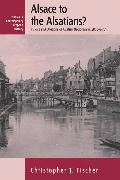- Start
- Alsace to the Alsatians?
Alsace to the Alsatians?
Angebote / Angebote:
...a fascinating and penetrating study .Fischer presents a nuanced analysis of Alsatian responses and shows how they were frequently contested, discontinuous, and even contradictory. General readers as well as scholars of France and Germany and those interested in problems of regionalism, nationalism, identity, memory, and cultural formation will find Alsace for the Alsatians? immensely beneficial and a pleasure to read." · Vernon L. Lidtke, Johns Hopkins University "[A] wonderfully broad and at the same time an impressive in-depth study...Fischer blends cultural and political history in exemplary ways. The strong interlinkages between regionalism and Catholicism in Alsace is powerfully highlighted by Fischer's narrative." · Stefan Berger, Professor of Modern German and Comparative European History, University of Manchester The region of Alsace, located between the hereditary enemies of France and Germany, served as a trophy of war four times between 1870-1945. With each shift, French and German officials sought to win the allegiance of the local populace. In response to these pressures, Alsatians invoked regionalism-articulated as a political language, a cultural vision, and a community of identity-not only to define and defend their own interests against the nationalist claims of France and Germany, but also to push for social change, defend religious rights, and promote the status of the region within the larger national community. Alsatian regionalism however, was neither unitary nor unifying, as Alsatians themselves were divided politically, socially, and culturally. The author shows that the Janus-faced character of Alsatian regionalism points to the ambiguous role of regional identity in both fostering and inhibiting loyalty to the nation. Finally, the author uses the case of Alsace to explore the traditional designations of French civic nationalism versus German ethnic nationalism and argues for the strong similarities between the two countries' conceptions of nationhood. Christopher J. Fischer received both his Masters and Doctorate degrees from the University of North Carolina at Chapel Hill. He currently is an Assistant Professor at Indiana State University. Recipient of the Fritz Stern Prize awarded by the German Historical Institute and the Friends of the German Historical Institute.
Lieferbar in ca. 10-20 Arbeitstagen

